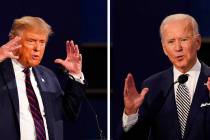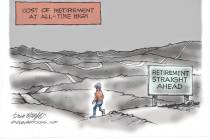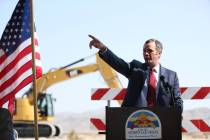The question Rory won’t answer
Rory Reid says his campaign for governor is about leadership, not expedience.
If you name an issue, the Clark County commissioner has a plan. Public schools and higher education? Check. Green energy? Yep. Economic recovery and diversification? Absolutely. Holding the line on taxes is a central part of that plan.
He has a documented, well-thought-out, firm answer for pretty much any question that could be asked in Thursday night's 6 p.m. debate with Republican nominee Brian Sandoval.
And you can bet the ranch that Reid will go after Sandoval at the Vegas PBS studios for not outlining his ideas and priorities -- particularly related to balancing the budget -- in the kind of detail the Democrat has.
Where Sandoval has staked out positions and principles, Reid has written doctoral dissertations.
It's ironic, then, that the question Sandoval answers more clearly, strongly and consistently than any other -- the most important question of the gubernatorial race -- is the one question that leaves Reid's campaign tongue-tied and talking in circles.
The question is: As governor, would you veto any tax increases passed by the 2011 Legislature, or would you sign them into law?
Sandoval says he'll veto any tax hikes that make it to his desk. Period.
When I posed the question to Reid's campaign three weeks ago -- a question Reid had never been asked, as far as I could tell -- the "man with the plan," the man who talked the same no-new-taxes talk as Sandoval and lame-duck Gov. Jim Gibbons, wouldn't answer.
When pressed by another journalist at a Sept. 15 campaign rally headlined by Bill Clinton, an evasive Reid finally said it would be accurate to report that he might sign a budget that includes tax increases.
But two days later, during an interview on Reno TV's "To the Point with Anjeanette Damon," Reid took "might" off the table, saying he would instead persuade lawmakers to sign his budget plan, which doesn't raise taxes. "I haven't changed my stance at all," he said.
But he did. He provided two very different answers to the question. And neither answer was remotely clear.
Reid still won't answer the question with a yes, no or even a maybe, which is a perfectly legitimate response.
In a discussion earlier this year with the Review-Journal's editorial board, Reid intimated that he wasn't fond of Nevada's payroll tax, which punishes businesses for hiring. If Reid wants to create new taxes and get rid of existing ones, let's have that debate. If Reid would veto a budget, for example, that merely extends the 2009 tax increases scheduled to sunset on June 30, let's hear it.
That would be leadership, wouldn't it, Rory?
Mike Trask, Reid's campaign spokesman, insists the question has been answered adequately. Last week, he offered the same non-answer that Reid gave Damon: "He's going to see that his budget is passed by the Legislature."
When I pointed out that this position was different from the one Reid took at the Bill Clinton rally, Trask said, "I don't know if those are different answers."
Followers of Nevada politics are intimately aware that tax increases require two-thirds support in each house of the Legislature for passage, and that lawmakers can override a veto by the same margin.
Provided it has the votes, the Legislature can act alone to raise taxes. So why is it so important to know whether a governor will veto tax increases or sign them?
Because a strong veto threat compels the Legislature to work quickly, be less greedy and avoid an overtime special session -- where the governor controls the agenda -- while a governor willing to go along with tax increases provides lawmakers cover to play political games and go crazy.
Both scenarios have played out in the past decade. In 2003, Gov. Kenny Guinn kept calling lawmakers back into special session to pass tax increases even though he didn't have the votes. After a brief constitutional crisis, lawmakers got their two-thirds support, and Guinn signed into law tax hikes that were far higher than necessary to fund the budget.
In 2009, Gibbons held his veto threat over lawmakers' heads the entire session. The Legislature responded by striking a deal on tax hikes a week before adjournment. Record tax hikes, to be sure, but smaller than lawmakers would have liked.
I pressed Trask about why Reid won't directly answer the veto question.
"You're asking a theoretical question," Trask said. "We don't know who's going to be up there (in Carson City). We don't know if the Legislature is going to have the votes (to raise taxes). We don't know what they're going to do."
We do know, however, that the Legislature's leaders -- majority Democrats and minority Republicans -- have acknowledged that more tax hikes are coming down the pipe in 2011. They've clearly stated that the next two-year budget can't be balanced on cuts alone -- as proposed by Reid and Sandoval.
So because of the uncertainty of November's election, Reid can't say whether he'd issue a veto, but at the same time he's sure he can get lawmakers to pass his spending plan? That's not theoretical? When many lawmakers of his own party have said they absolutely won't vote for a budget that doesn't include tax increases?
If Reid might support some tax increases or tax changes, punting the task of proposing them to lawmakers isn't leadership. It's expedience. It's exactly the kind of politics Reid has ridiculed.
Reid is running as a fiscal conservative, and he's losing badly. Voters aren't buying it. The idea that a Democratic governor will stand up to a Democratic Legislature and dial back the size of state government is laughable.
If Reid can't clearly answer the veto question during Thursday's debate, we'll know his no-new-taxes budget is a fraud. Sandoval will have the high ground on taxes and spending, no matter how many position papers Reid stands on.
Reid wants to be in the room when the budget deal is cut. A veto threat keeps him out of the room.
It's that simple.
I won't be surprised to see Reid try to label Sandoval a tax hiker over the former attorney general's role in the 2003 budget drama, a tag that didn't stick in the GOP primary. I won't be surprised to hear Reid say a Sandoval administration is akin to a second Gibbons term, even though Reid has (supposedly) adopted Gibbons' anti-tax ideology himself. I won't be surprised if Reid says he balanced Clark County's budgets without ever raising taxes -- never mind that the County Commission doesn't have the power to raise taxes.
A clear, honest answer on the veto question? Now that would be a surprise.
Glenn Cook (gcook@reviewjournal.com) is a Review-Journal editorial writer.























